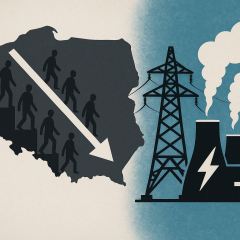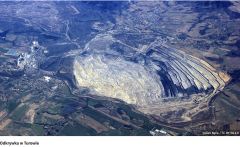Gazeta Wyborcza - one of the largest Polish newspapers published an article about the biggest Polish bank PKO BP and its role in financing the construction of Ostrołęka C coal power plant (http://wyborcza.pl/7,155287,25319274,nie-dadza-kasy-na-czarne-paliwo.html). According to the article Polish NGOs accused PKO BP of sabotaging the global fight against the climate crisis. In a letter sent to the bank's president, Zbigniew Jagiełło, they list how strongly PKO is involved in the financing of the largest Polish coal companies. The bank provided 500 mln PLN to PGE in 2018 r., 300 mln PLN worth of loans to Enea from 2012 to 2015 r., 2 bln PLN corporate loan to Energa in Sept 2019 (together with Banco Santander, la Caixa and MUFG), 800 mln PLN loan for Tauron and 676 mln PLN in loans for ZE PAK.
The activists emphasize that supporting coal investments and coal dependent utilities is delaying coal phase out in Poland. The new coal-fired Ostrołęka C power plant is being built in Poland. It is not yet certain whether the construction will be completed because no international financial institution has decided to get involved in the project.
Over 100 institutions around the world have already declared that they will not finance entities that invest in fossil fuels. This is due to the rising costs of producing energy from fossil fuels, primarily from coal. The investor does not know what the price of coal will be and how much the producer will earn on energy. Prices of CO2 emission allowances have recently increased by 300% It is difficult to finance large coal projects without state support mechanisms. Additional pressure can be effectively exerted by customers who prefer to pay more for energy than support projects that destroy the environment.
Changes in the financial sector are also visible in Poland. In domestic branches of foreign banks, the policy is no different from that set out by the central. Financial institutions must respond to social expectations that are pro-climate.
Meanwhile, environmental organizations note that banks' policies are often not consistent with energy financing. The situation of Polish energy companies is getting worse. It is much more profitable to import electricity from abroad today, because thanks to the large share of renewable energy it is getting cheaper, while the one from coal - more and more expensive. Wind and solar power plants do not emit expensive CO2, and the fuel is for free. So they are less risky from the perspective of a financial institution. So there is hope that trends in financing energy will help accelerate decarbonisation. Poland is just beginning an energy transformation and the value of energy projects that are needed exceeds EUR 200 billion. It is hard to imagine that companies will organize such capital without external participation. This means that they will have to take into account the conditions of financing institutions.
According to the "Fossil Fuel Finance Report Card 2019", 33 global banks (e.g. JPMorgan, Bank of China, Deutsche Bank) have provided $ 1.9 trillion companies to fossil fuels since the Paris Agreement in 2015. 600 billion went to only 100 companies that intensively develop their activities in the area of their extraction and combustion. The most responsible for financing coal investments are American banks (37%).








